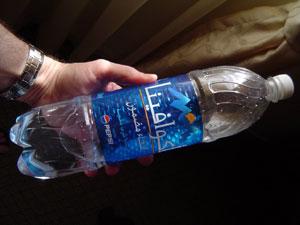Water and Cooperation in the Middle East
CC: Liquid Lucidity / Flickr
You’ve heard it said, we never know the worth of water till the well is dry. Alas, the proverbial well in the Middle East has been dry for years. Water shortages contribute to the already substantial tensions between Israel and the Palestinians. Some non-governmental organizations on both sides are working on the water problems together.
On the outskirts of the Palestinian village of Uja, near the West Bank town of Jericho, a natural spring bubbles and feeds a small river that winds toward the village. The spring is full now after recent heavy rains, but in a few months, say residents here, it will dry up completely. Despite the recent rain, the region remains in the grip of a long-term drought. And Uja mayor Suleiman al-Romaniyim says the local water crisis is intensifying each year, driving many farmers out of business. Romaniyim hopes to reverse that trend by somehow getting more water for his village.
"Our aim is that we can be supplied either by extra water, through the Palestinian water authority, and we are asking the Israelis to give us permission and permits to be able to drill new wells, or to create dams to retain the water and not to lose it."
Mayor al-Romaniyim is pinning his hopes for more water in part on help from an independent organization, Friends of The Earth Middle East, which is trying to help the village find new ways to get the spring’s water to outlying farms. Friends of the Earth is one of the few independent groups that’s able to talk with both the Israeli and Palestinian governments about water issues. The group has offices in Israel, Jordan and the West Bank, and has established dozens of local centers, including one currently under construction here in Uja. Nader al-Khatib is its Palestinian director.
"We are a regional organization that is still very active and had gained credibility in the three countries. When it comes to the Palestinian authority, we are well known, we have close relations to the relevant authorities."
The system that divides water between Israelis and Palestinians in the West Bank dates back to the Oslo peace talks more than a decade ago. The Palestinian population has grown significantly since then, but the amount of water they receive is the same. Israel also supplies water to Jordan, under the two countries’ peace agreement. And the region’s drought is putting still more strain on all three parties. Gideon Bromberg, the Israel Director of Friends of the Earth Middle East, says that just as the problems are regional, there’s growing awareness that the solutions must be regional as well.
"We see steps, concrete steps, commitments where there were no commitments, awareness where there was little awareness, and therefore we remain optimistic that in this issue the cooperation that we do lead will bring fruit."
One of Friends of the Earth’s highest profile efforts is a project to increase the amount of water available in the West Bank by cleaning up the heavily polluted Jordan River. Another site of collaboration is Kibbutz Ketura, in southern Israel. That’s where students from Israel, the Palestinian territories, Jordan and around the world go to study and live together at the Arava Institute. The Institute is affiliated with Ben Gurion University of the Negev. Clive Lipchin is its director of research.
"Where there is cooperation is in the research field, a lot of cooperation. And most of the cooperation is through the NGO communities. I mean, the Palestinian territories in water sector, I think in some respects the NGO community is more powerful and more influential than the government. The Palestinian government cannot really openly collaborate with Israel for their own political reasons. But NGO’s are more pragmatic, you know, have greater maneuverability."
Lipchin has just completed a three-year study of two streams that run through Israel and the Palestinian Authority. The streams are so polluted they can no longer supply drinking water. Lipchin says he worked extremely well with his Palestinian counterpart, who happens to be Nader al-Khatib, the Palestinian director of Friends of the Earth.
Both Bromberg and Lipchin are calling for a new mechanism for water sharing between their government and the Palestinians. And while many issues, such as the future borders of a Palestinian state and Jerusalem are mired in controversy, these experts say working together on water sharing could improve the adversaries’ overall relationship. Ultimately, given the growing severity of the problem, many experts say Israelis and Palestinians will have no choice but to cooperate more broadly on water issues at least.
Bromberg says, "We’re dependent on each other. This is not an issue of doing a favor to the other side, this is a self-interest, this is an issue of necessity that can no longer wait. One of our strongest messages of the moment is that the water issue must not be held hostage to the conflict."
PRI’s "The World" is a one-hour, weekday radio news magazine offering a mix of news, features, interviews, and music from around the globe. "The World" is a co-production of the BBC World Service, PRI and WGBH Boston.
Every day, reporters and producers at The World are hard at work bringing you human-centered news from across the globe. But we can’t do it without you. We need your support to ensure we can continue this work for another year.
Make a gift today, and you’ll help us unlock a matching gift of $67,000!
